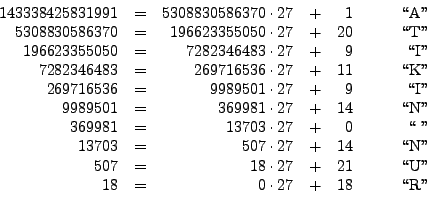Next: Some Complete Examples Up: The RSA Cryptosystem Previous: How RSA works Contents Index
Suppose ![]() is a sequence of capital letters and spaces, and that
is a sequence of capital letters and spaces, and that ![]() does not begin with a space. We encode
does not begin with a space. We encode ![]() as a number in base
as a number in base ![]() as follows: a single space corresponds to 0
, the letter
as follows: a single space corresponds to 0
, the letter ![]() to
to ![]() ,
,
![]() to
to ![]() ,
, ![]() ,
, ![]() to
to ![]() . Thus ``RUN NIKITA'' is a number
written in base
. Thus ``RUN NIKITA'' is a number
written in base ![]() :
:
| RUN NIKITA |
||

If
![]() , then any sequence of
, then any sequence of ![]() letters can be encoded as above
using a positive integer
letters can be encoded as above
using a positive integer ![]() . Thus if we can encrypt integers
of size at most
. Thus if we can encrypt integers
of size at most ![]() , then we must break our message up into blocks
of size at most
, then we must break our message up into blocks
of size at most
![]() .
.
sage: def encode(s):
... s = str(s) # make input a string
... return sum(ord(s[i])*256^i for i in range(len(s)))
sage: def decode(n):
... n = Integer(n) # make input an integer
... v = []
... while n != 0:
... v.append(chr(n % 256))
... n //= 256 # this replaces n by floor(n/256).
... return ''.join(v)
sage: m = encode('Run Nikita!'); m
40354769014714649421968722
sage: decode(m)
'Run Nikita!'
William 2007-06-01